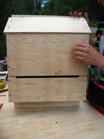Midges
Question of the Week:
Every Spring, we are infested with swarms of tiny flies. They are so bad this year that it is impossible to spend time comfortably outdoors. What are they?
I keep hoping that the birds will eat them, but so far no luck.
They can often be seen in the distance in cloud formation.
Answer:
The flies are likely midges. And without more of a description of where you live, I can’t say more than that. Midges are usually the ones you see in swarms and they are quite small. They swarm when they mate and are harmless to people (if they are non-biting midges – biting midges do exist and can cause rather large, painful bites that seem almost impossible when compared to their size). Biting midges are much smaller than non-biting midges.
Their adult life is fairly short, lasting about 2 weeks so while they may be annoying, at least they don’t last long.
I assume you live near a water body: this is where they lay their eggs and where the larvae grow to adulthood, burrowing into mud until they have developed into adults. They swarm close to water bodies or muddy areas to avoid long distance travel once mating has been achieved.
Unfortunately, there aren’t any safe products available to control them effectively. Because they breed near water and mud, leaching is a serious concern and any pesticides can cause negative effects down the line.
Your best bet is to wait out the 2-week mating time. Keep outdoor lights shut off for as long as possible to keep them away from the house and draw blinds to avoid light escaping to the outdoors, attracting them towards the house.
You can try attracting bats to your area by building a bat box. Bats cut down on adult midge numbers which should mean fewer eggs, larvae, and adults next spring.
Finally, while midges are annoying and can make being outside in the evenings a bit of a hassle, know that they are a very important part of the ecosystem. It’s not just bats that eat them: fish and other insects feed on the larvae and eggs.




